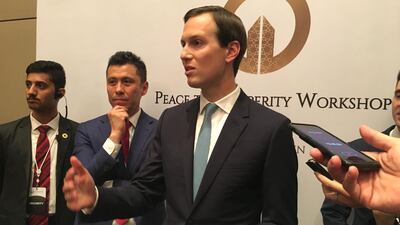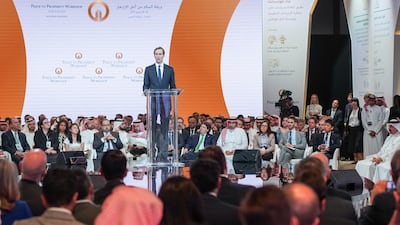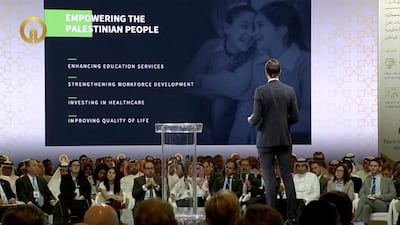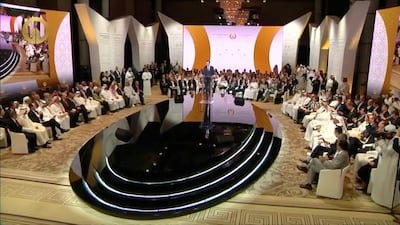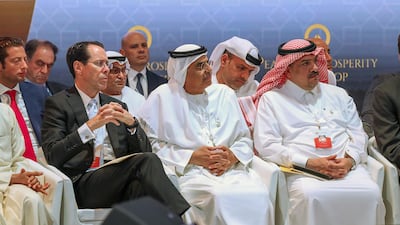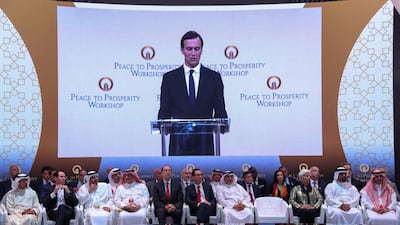White House adviser Jared Kushner closed the US-sponsored economic workshop in Bahrain on Wednesday promising that President Donald Trump would help the Palestinians to “achieve a better future”.
But Mr Kushner, also Mr Trump's son-in-law, remained silent on the details of any political portion of the US plan for Middle East peace.
“What you see in this region is that President Trump keeps his word,” he said at a luxury hotel in Manama, pointing to the US embassy shift to Jerusalem, withdrawal from the Iranian nuclear deal and the end of the ISIS "caliphate".
Mr Kushner said the Palestinians, who have cut all ties with the US, had no reason not to trust the American leader, despite the embassy move, and the withdrawal of support to the UN refugee agency for Palestinians and hospitals in occupied East Jerusalem.
“President Trump said he wants to help the Palestinians achieve a better future for themselves and I hope you take it very seriously that he is going to work hard to do that,” Mr Kushner said.
The two-day workshop discussed the potential of a US economic plan entitled Peace to Prosperity, which seeks $50 billion (Dh183.64bn) in investments in the West Bank, Gaza, Egypt, Lebanon and Jordan.
The plan has been widely criticised for not mentioning Israel’s military occupation or the economy of occupied East Jerusalem, home to some of the holiest sites in Islam.
Panellists on Wednesday told the Trump administration that there could not be an economic agreement before a political deal that solves the decades-long conflict.
"Improving economic conditions and attracting lasting investment to the region depends ultimately on being able to reach a peace agreement," International Monetary Fund managing director Christine Lagarde said after her appearance at the workshop.
A range of panellists praised the plan’s ambitious attempt to break the decades-long stalemate, but said there were conditions for it to succeed, mainly good governance and a political agreement between the Palestinians and Israel.
Palestinian leaders boycotted the conference and there were no Israeli officials present.
The Palestinian Authority, which has limited self-rule in the occupied West Bank, repeated its rejection of the peace initiative on Wednesday.
“It’s not only that the Trump administration is trying to disband the international system, reinventing the rules, but now they are even trying to reinvent the concept of peace, which for them seems to be the equivalent to slavery and apartheid,” a Palestinian official told The National.
"What we tried to do is to keep this devoid of politics," Mr Kushner said.
He said the Trump administration would talk about the political side at a later date: "We'll see what happens."
Mr Kushner was dismissive of the suggestion that his plan lacked credibility without mention of Israeli policy in the Palestinian territories.
“If that’s people’s criticism then that’s people looking to find ways to be critical,” he said. “People just have to listen, then they have to be more thoughtful.”
Jason Greenblatt, Mr Trump's Middle East envoy, gave more hints about what the political side of the plan might include, saying talk of a two-state solution would not be in the document.
“We don’t use the phrase two-state solution," Mr Greenblatt said. "We find that it is a slogan from the past."
He said the political portion of the plan ran to dozens of pages but Israeli elections scheduled for September could delay its publication.
Mr Trump had been briefed on the economic and political plans but had not “pored over” their contents, Mr Greenblatt said.
Asked why Mr Trump was not in attendance in Bahrain if he was serious about peace, his envoy said: "I don't think him being here would change the equation."
The UAE and Saudi Arabia sent ministers to Manama at a time of heightened tensions in the region.
They gave their support for the economic proposal, as long as it was implemented on the basis of the Saudi-led Arab Peace Initiative, which advocates a two-state solution based on 1967 borders with occupied East Jerusalem as the Palestinian capital.
“We should give it a fair chance,” Obaid Al Tayer, UAE Minister of State for Financial Affairs, told the workshop of the economic plan.
But the participation of Arab states was not universal. Lebanon and Iraq did not participate and Egypt, Jordan and Morocco only dispatched deputy finance officials. Mr Greenblatt however said he was pleased with the turnout.
“I give credit to Bahrain for hosting it, there’s been a lot of pressure trying to get them to not host it. We are not looking to put anybody in danger. Not Israel, not Jordan, not Egypt, not the Palestinians,” he said.
“We are going to do our best to be sensitive to those things and hope they are willing to engage on it. And Jordan and Egypt are important voices on that.”
His praise for Arab states came against the backdrop of protests in the Gaza Strip where demonstrators burned effigies of President Trump and Israeli Prime Minister Benjamin Netanyahu. In another diplomatic twist on Wednesday, Oman said it would open an embassy in the Palestinian territories, a first for a Gulf state.
